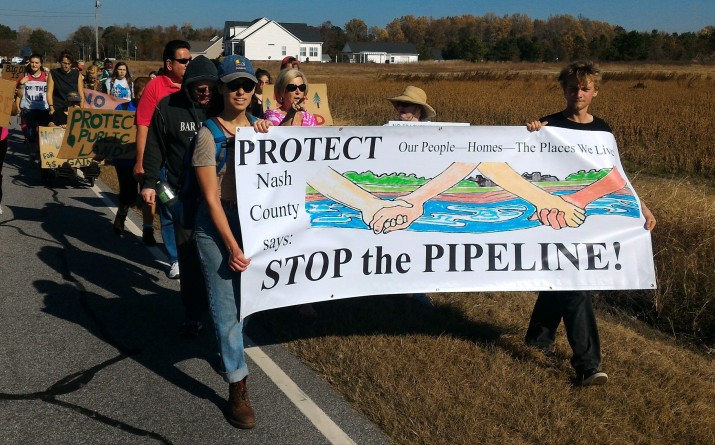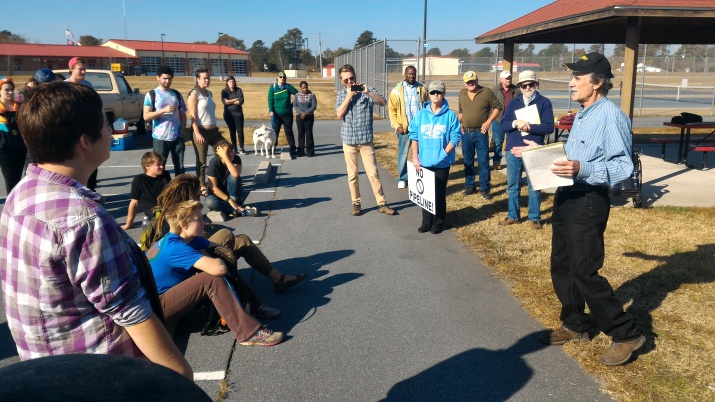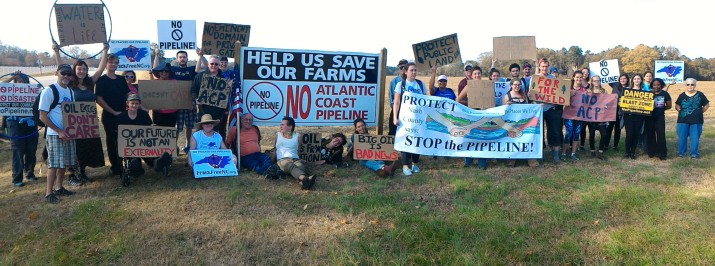
By Greg Yost for NC PowerForward
Atlantic Coast Pipeline co-developers Dominion Resources and Duke Energy together are valued at one fifth of a trillion dollars—and friends, that’s trillion with a “t”. So the 550 mile, $5 billion fracked gas pipeline project they announced several years ago must be a done deal by now, right?
Wrong. As delays to the project mount, opposition to the energy companies’ plan continues to stiffen. In Natural Bridge, Virginia recently, nearly two hundred landowners, legal experts, property rights defenders, consumer advocates, and environmental activists assembled mid-November for a full day strategy session about how best to further their collaboration on their common goal of stopping the ACP. As an attendee from North Carolina, I was impressed by how advanced this organizing already is. From the beginning, Virginia has led the way in grassroots opposition to the pipeline.
But now my state is catching up. On Saturday, November 19, three impacted North Carolina counties staged coordinated, simultaneous marches to draw attention to the pipeline and to educate their communities about possibilities for resistance. As announced in a joint press conference held November 15, each march was planned and sponsored by a local community organization. In rural Nash County, the organizers were from a group called Nash Stop The Pipeline. In Cumberland County, home to Fayetteville and the Ft. Bragg military base, planners were a multi-racial group of landowners targeted by the pipeline calling themselves Cumberland County Caring Voices. And in Robeson County, itself an especially racially diverse community given its 38% indigenous peoples population, organizers were members of the group, Eco-Robeson.

Of course, marching is nice, but it’s fair to ask what normal people like these can do in the real world against the combined might of behemoths like Dominion and Duke. The answer, I think, lies in pipeline opponents’ sense of their own strength and resolve. They believe that despite a monetary disadvantage, they have a clear set of diverse issues around which they can build a broad based coalition and a winning campaign. The misuse of the power of eminent domain, for example, is opposed by people from across the political spectrum. Similarly, organizers believe that an inevitable dramatic increase in energy bills for ratepayers is a winning issue once the public becomes educated about the enduring costs not only of the pipeline, but of the nearly twenty gas-fired plants which Duke Energy intends to build in the place of new sun and wind power generation. Organizers also believe that the role fracked gas plays in producing catastrophic new levels of flooding and climate change will be persuasive in an area like eastern North Carolina which experienced devastation only recently from Hurricane Matthew.
This pragmatic optimism about the fight ahead was captured for me Saturday in an offhand comment by Marvin Winstead, a Nash County farmer and leader in Nash Stop The Pipeline whose burgeoning skills as a community organizer are impressive. A heckler had just driven by our line of walkers late in the day to taunt us with the astonishingly unoriginal shout of “Get a job!” before speeding away. One bemused marcher was heard to ask, “It’s Saturday and I have a job–what’s so surprising about me spending a weekend afternoon doing something that I want to do?” I laughed and agreed.
“If you’ll get out and give me a half an hour chance to talk with you right here, right now on the side of this road, I bet you’ll change your mind about what we’re doing.” –Marvin Winstead
Marvin’s own response a moment later, however, made me stop and think. He simply said, “I wish that I could have spoken with him. I would have said, If you’ll get out and give me a half an hour chance to talk with you right here, right now on the side of this road, I bet you’ll change your mind about what we’re doing.” And as I reflected on Marvin’s attitude, I saw in it a source of strength for this campaign. In the competition for minds and hearts across the region, state, and nation on this issue of building yet more expensive, dangerous, and unnecessary fossil fuel infrastructure, corporations like Duke and Dominion are at a distinct disadvantage. By telling the truth about this pipeline in persistently courageous and creative ways, we will build the necessary power to deny Duke and Dominion what they need but do not yet have despite all of their money: the support of local communities and the land upon which to build. As Marvin and his friends understand, this story is far from over. In fact, in light of the unprecedented level of coordination of local and state opponents on this issue, it’s only now just begun.

To be sure, #NoACP promises to be a struggle every bit as epic as #NoDAPL. But the cooperation, vision, and the growing strength which these North Carolina communities of resistance are now demonstrating augurs well for their upcoming battles. The fight to wrest control of our clean energy future from abusive, domineering corporate power is on!
